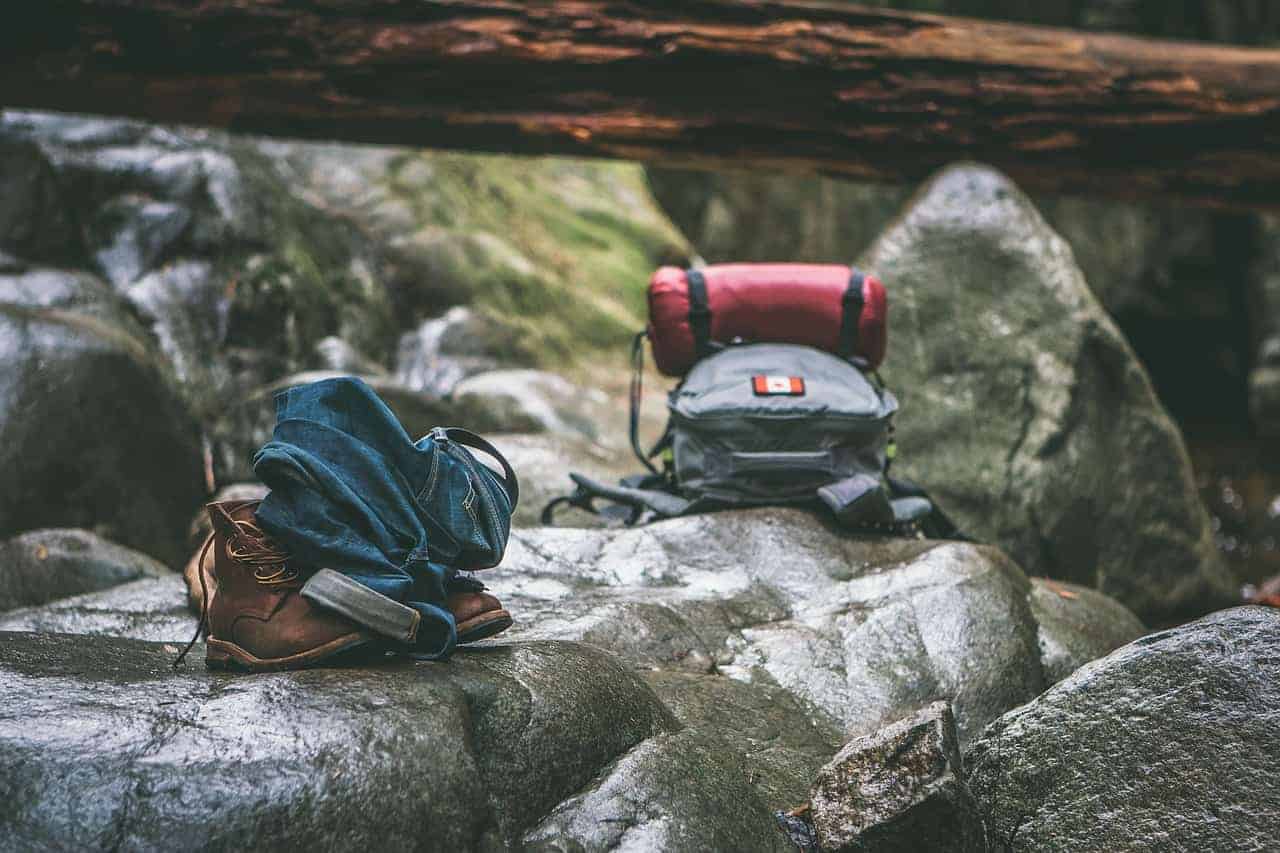Many hiking tips can help you avoid costly mistakes. if you find yourself in an unexpected situation, you’re going to be very glad to know the information in this post
During my Hiking experience, I made a lot of mistakes. In this post, I’m sharing with many information and my experience feedback for you to avoid making the same mistakes.
Many beginner hikers tend to minimize hiking equipment importance. Here are some ideas that might save your hiking day. Be sure you check the list of equipment and considerations before you go hiking.
How Long Does It Take To Hike
| Distance in miles | Distance in km | Duration |
| 1 mile | 1.6 km | 20minutes |
| 1.5 miles | 2.4 km | 32minutes |
| 2 miles | 3.2 km | 43.2minutes |
| 2.5 miles | 4 km | 54.32minutes |
| 3 miles | 4.8 km | 1 hour and 5 minutes |
| 3.5 miles | 5.6 km | 1 hour and 17 minutes |
| 4 miles | 6.4 km | 1 hour and 28 minutes |
| 5 miles | 8 km | 1 hour and 49 minutes |
| 6 miles | 9.6 km | 2 hours and 11 minutes |
| 7 miles | 11.2 km | 2 hours and 33 minutes |
| 8 miles | 12.8 km | 2 hours and 55 minutes |
| 9 miles | 14.4 km | 3 hours and 18 minutes |
| 10 miles | 16 km | 3 hours and 40 minutes |
| 11 miles | 17.6 km | 4 hours and 2 minutes |
| 12 miles | 19.2 km | 4 hours and 24 minutes |
| 13 miles | 20.8 km | 4 hours and 46 minutes |
| 14 miles | 22.4 km | 5 hours and 9 minutes |
| 15 miles | 24 km | 5 hours and 31 minutes |
| 16 miles | 25.6 km | 5 hours and 53 minutes |
| 17 miles | 27.2 km | 6 hours and 15 minutes |
| 18 miles | 28.8 km | 6 hours and 38 minutes |
| 19 miles | 30.4 km | 7 hours and 0 minutes |
| 20 miles | 32 km | 7 hours and 22 minutes |
| 30 miles | 48 km | 10 hours and 44 minutes |
Beginner Hiker Tips
But before going through the list, I get asked how I start hiking: as a beginner, you should start by keeping it simple.
Could you keep it simple?
Start with a simple hike.
Keep it simple. It’s like when you want to run a marathon. You start with smaller runs of a few miles, and you make your way up to running half marathons and marathons. The same goes for hiking.
So start by finding a hiking place in your area, of a four to five miles flat hike, with some lovely little pathways. It can be a small park in your city, so you’re still close enough to civilization, and your cell phone works there.
Know your walkability
The nice thing about having a fitness tracker is that
- You’ll be able to map the walks that you take
- And you know what a four to five miles walk feels like
From there, you’ll be able to evaluate your hiking skills.
Use a hiking app
If you don’t know where to hike, download an app like all trails onto your phone. It ranks all the hikes in your area from easy-moderate to complex. It will also track your progress while you’re out on that trail.
You can also buy any maps or guides at your local adventure store
Safety
Informe someone
Inform someone about your hiking plan. It’s just excellent practice to share with someone:
- Where you’re going
- How long do you intend to be out
- When you’re expected to be back
- What path you intend to take is
- And maybe also what you’re wearing for the day
Even planning a short day hike, you still need to do this because we never know what can happen.
It is so easy:
- You can leave a note
- You can text your friend or a family member
If someone gets your back in case of a problem will give you peace of mind when you’re out on the trails.
Even if it is useless most of the time, You should not skip this part of the preparation.
Just take 5 seconds texting somebody (your mother, your partner, roommate ), giving them some information,
Safety gear
Think about the safety gear you want to take on your trip.
Safety clothing,
Boots, pants, and gloves are also things you should consider. Sometimes, hiking and trekking require you to use long pants to prevent chafing. Consider purchasing a pair of long pants before you begin your adventure.
First aid kit
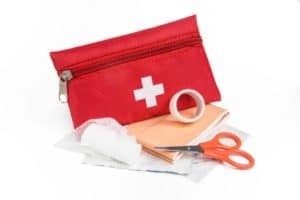
You should also have a first aid kit, necessary safety precautions, and other basic safety precautions.
Hiking Gear/equipment set
First, be informed about the type of hiking you’re planning to do, the dangers, and the conditions, choosing the equipment set that is appropriate for this type of trip.
You need the right gear but don’t want to break the bank by buying new equipment.
The last thing you want is to have a hike ruined by mangled toes and blisters.
So you need To carry some essential systems for hiking. The goal is to be prepared for any unexpected situation. Having all the essential things provides peace of mind when you go out for a hike.
Map
This issue is a common mistake. Make sure you have a map and a clear idea of where to avoid the natural trails and paths.
In some areas, no network allows you to use your phone. So having a map as a plan B could save your day.
Hiking poles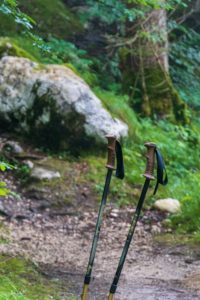
While some trips can be completed without hiking poles, others may require you to use them for added security.
Some hikers use the poles once the height gets hard. Others use poles right off the bed.
They’re beneficial for transferring the weight with each step you take, so it’s not always right on your feet every single time. You can take a lot of the weight off by using your arms and pulling yourself up with your poles if your legs get tired.
I find that they allow me to go way faster and smoother I feel more confident even when I slip; I just know that there’s something there that can catch me.
Some people are super anti-pole that’s because I haven’t tried poles yet 🙂
Shoes
Get the right shoes. They are so important. I remember one time I made a trip, I was wearing a pair of boots, and I had them too loose, and just because the trip was long on the way back, my toes were in so much pain because they were just being crushed into the front of my boots. After all, I didn’t have them tied properly. It is so important to have good shoes, or you’re going to have a bad time.
And the grip of your shoes, depending on where you’re going, can be essential too because some summer shoes are just unsafe to wear, making specific trails on particular terrain.
I used fitness or trail runners in the past, but I’ve broken my ankles. I’m using a slightly higher boot to provide more stability in the areas where I have problems.
But remember that a boot is a little bit heavier than a runner, and the more serious the boot or Footwear, the faster you will fatigue.
Clothes materials
Cotton kills. That’s why I wear the same kind of shirt that’s synthetic.
When you sweat when you get cold, that water and moisture are not going to go away, so if for some reason the wind picks up or the temperature drops, you’re going to be stuck in a cold, wet t-shirt, and it’s not going to be able to drive no matter what you do.
That’s actually like the worst thing is when you’re sweating hard going up a mountain, and then once you reach the peak, it’s freezing, and then you become cold because your shirt is wet.
So get like one exceptional workout shirt that you have for your hikes, and that that’s all you need
Backpack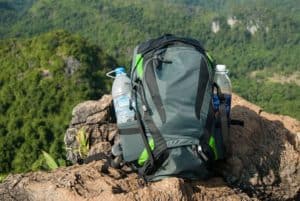
The next piece of gear I recommend you look into is a backpack. I got mine for about 30$. Before that, I was wearing another bag that was okay, but I changed it because it doesn’t have good ventilation, so it’s a little bit warm on the back.
When you get into the more significant hikes, you must look at bigger, better, and more expensive bags.
Camera
Some of the other gear that I recommend would be a camera to take some pictures. Those will motivate you next time you want to go hiking again. You could also bring your phone.
Phone
As an experienced hiker, I recommend that people not bring their cell phones out and have that chance and that ability to unplug. Although that being said, quite often, a cell phone can also be a safety net.
But some parks have cell service that you could use to call for health if something goes wrong.
In that case, leave your phone at home. While hiking, you want to unplug and get away.
Headlamp
There have been times that we’ve been hiking throughout the day, and then the Sun is setting earlier than I predicted. For some reason didn’t check, or you wanted to keep taking pictures at the top, and then I ended up hiking down in the dark.
Hiker considerations
Hiking with Children
If you take a child on an excursion, you should be confident that they understand the rules of the outing and has the necessary knowledge. Follow your child’s health care provider’s advice to ensure your child has the proper precautions.
Hiking groups
This is for hiking groups: make sure that everyone in your hiking group knows the route.
So if you’re hiking with other people, make sure all of you know the plan so they can be prepared for the hike.
- Where do you intend to go
- How long
- The distance
This can be helpful in some situations: for example, if you got separated, you know where you are and where you’re trying to go. So there will be no panic.
Also, this will allow every participant to prepare the necessary pieces of equipment, water, and food, for the planned hike.
The weather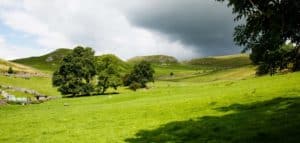
To check the weather seems to be an obvious step, but we sometimes skip it. However, know that the weather can change very quickly. So before going, have a quick look at the weather previsions and adapt your types of equipment.
Always pack for cold and hot weather.
I don’t know about you, but every time that I’ve reached an exposed part of the trail that’s either under direct sunlight or like with no trees around to block the wind, it’s either so much colder than you thought or so much warmer than you got
Sometimes it’s so hot hiking, and then the moment you sit down and stop walking, you might feel cold, so always bring a jacket or a puff like it’s so light, and you will. It’s a lifesaver.
Wildlife and Animals
Be aware of local wildlife in the area you’re hiking: bears and snakes.
So just ensure you’re prepared by knowing what animals and habits this land is.
Backpack organization
The organization is essential. You want to organize your backpack to make it easy each time you need something.
When you go for a long hike, you’ll need to compress many things in your backpack.
I’m always impressed by how much stuff we can fit in our backpacks by rolling it up and folding it to their absolute minimum surface area. But doing that increases your attitude and ability to have a good time on the trail. but even if you’re compressing stuff in your pack, if you pack them wrong and you’ve got the weight distributed all funky, you’re going to have a bad time bad time
Preparation
You need to be prepared and ready for your adventure. Part of that preparation process starts at home, with your computer.
there is a process that I go through when I’m getting prepared before a hike :
- Check your local hiking website for suggested paths.
- How can you get to the park by car? Bike?
- Are there parking areas?
- Are there any slopes?
- What are the park entry points?
- Are dogs allowed?
- Are bikes allowed?
Hydration
If you’re going for a hike one day, the night before, you should be drinking at least one liter of water, and that’s to delay any thirst or dehydration that might come the next day.
If you drink the night before, you won’t have to worry about being dehydrated in the morning because if you drink in the morning and you’re going on your hike right away, you’re going to have to pee right away, and no one wants to pee on the trail, to be honest,
I’ve noticed such a huge difference when I drink some water and stay hydrated throughout the day. The night before I do a hike, it’s just easy to wake up and feel refreshed and get going for the day.
Check for natural water sources.
On the topic of water, I usually pack two liters or so, which is ideal for taking on any hike. Still, I can fill up if I know there is a fresh glacier lake at the top or a river on the way. I’ll bring purification tablets or a water filtration method instead of carrying two liters for the entire day.
Mindset
Mind over matter
Hiking is as much of a mental sport as it is a physical one. you have to go into every hike with a good mindset and a positive attitude
Hiking is a great way to get past things you’re frustrated about, but in terms of the actual hike and what you’re doing, it’s not good to have any negativity towards that because if so, it’s too easy to quit.
I talked a bit about having a good attitude and a positive mindset, but it’s useful to do favors for yourself to make that mindset easier.
Pace yourself
Sometimes when I hike, it’s about the time that I make. Still, other times it’s purely for enjoyment and being in nature. Around my friends or whatever the situation is, and to enjoy your surroundings and the people around you, it’s important to pace yourself.
Because I only started hiking about a year or so ago, at first, I found it painful because I was with a group of people that would always go fast at that point. It just seemed like an intense workout as I started hiking with a group, I began to slow down, and I began to find that, if you’re not taking it as a hardcore workout, it’s way more enjoyable, as long as your feet don’t hurt which brings us into our next point.
Find another hiker
This person will be your safety net. he will help push you up the hill, and he will be able to share your successes, your victories, and all the memories
If you don’t know anybody who hikes, there are a lot of online hiking groups where you can meet other experienced hikers willing to take you out and get you used to the area, especially if you’re new to an area.
Walking posture
This is about your walking posture: many beginner hikers tend to have their heads down while walking.
Don’t be mindful. Take a look up, take a deep breath, and notice your senses and the beauty of the trees: Make sure just to have fun and experience nature.
Enjoy
Probably the most straightforward advice but the most important of the steps: go outside, hike, relax and enjoy. You don’t have to rush down the trail. Take the time to look at the different types of plants and trees. Stop to take pictures and enjoy the views. There’s no need to rush. Go outside and find your adventure.
Conclusion
So these are things I wish I knew before starting hiking, and I think every hiker should have before going out on their first trial.
